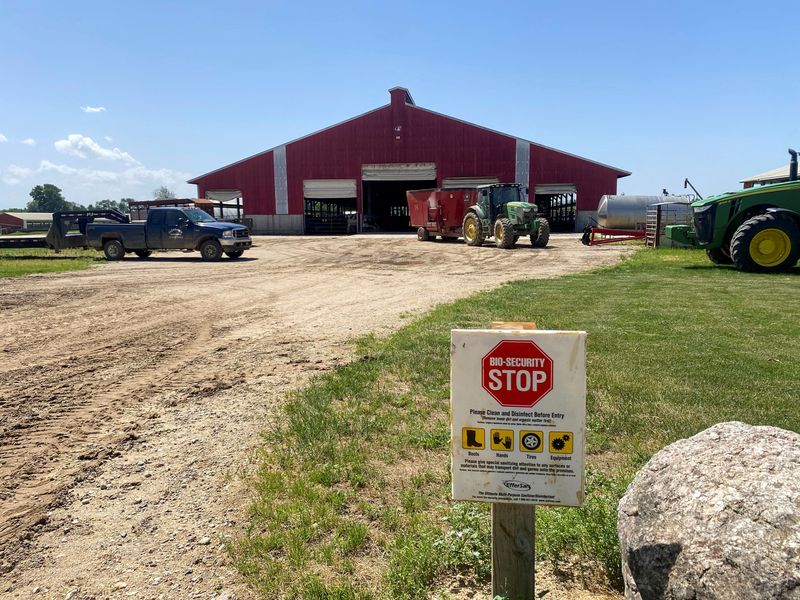By Leah Douglas and Tom Polansek
WASHINGTON/CHICAGO (Reuters) - U.S. farmers are increasing pressure on the Biden administration to allow vaccinations for chickens, turkeys and cows to protect them from bird flu infections that have devastated flocks for three years.
This autumn, flocks in the $67 billion U.S. poultry industry for the first time face a double risk for infections from dairies and migrating birds that can spread the disease.
Bird flu, which is lethal for poultry and reduces milk output in dairy cows, has eliminated more than 100 million chickens and turkeys since 2022 in the biggest U.S. outbreak ever.
Rose Acre Farms, the second-biggest U.S. egg producer, wants the U.S. Department of Agriculture to allow vaccinations, CEO Marcus Rust told Reuters. The company lost millions of hens in outbreaks and is relocating an Indiana facility for breeding chickens because it sits across a highway from a wildlife refuge that attracts migratory ducks, he said.
"We're farmers. We want our animals to live," Rust said.
The virus' jump to cattle in 14 states and infections of 13 dairy and poultry farm workers this year have concerned scientists and federal officials about the risks to humans from further spread.
The nation's leading egg, turkey and dairy groups argued in an August letter to Agriculture Secretary Tom Vilsack that the economic toll of the outbreak justifies deploying a vaccine. And federal lawmakers say USDA should accelerate its vaccine research and develop new methods to help farmers avoid outbreaks.
"It is obvious that the current outbreak has no end in sight," a dozen members of Congress, led by Representatives Randy Feenstra, a Republican, and Democrat Jim Costa, said in another August letter to Vilsack.
A USDA spokesperson said the agency has been collaborating with state and federal agencies and researchers to protect livestock, farmers and farm workers and is researching animal vaccinations.
However, Vilsack said in a previously unreported March letter to members of Congress that a vaccine campaign would face challenges including potential barriers to exports. Many countries ban imports of vaccinated poultry because of concerns that the vaccine could mask the presence of the virus.
"Widespread vaccination of commercial poultry is not possible in the short term," Vilsack wrote in the letter, which the animal welfare group Farm Forward obtained through a public records request and shared with Reuters.
'REASON TO HAVE HOPE'
A growing number of countries are considering once-taboo vaccines. France last year began vaccinating ducks for bird flu. New Zealand, which has never had a case of bird flu, is testing a vaccine on five species of wild birds.
The U.S. approved emergency use of bird flu vaccine to protect California condors last year.
"The only use of a vaccine in the U.S. is in this particular case due to the endangered status of that wild bird," said Julianna Lenoch, a USDA wildlife disease expert. The U.S. vaccinated 94 condors and saw deaths from bird flu stop, she said on a Thursday webinar.
Bird flu eliminated 17 million egg-laying hens from April through July, according to USDA data. By August, retail egg prices eclipsed $3.20 per dozen and reached a 16-month high, federal data show.
The egg industry will need to increase supply to reduce prices and the migratory period creates uncertainty, said Brian Moscogiuri, a vice president for Eggs Unlimited.
The migration season for wild birds is underway and will last until December, with waterfowl flying south from northern states like Minnesota, experts said. Blue-winged Teal ducks can travel all the way to South America, said Andy Ramey, research scientist for the U.S. Geological Survey.
Brazil, the world's top chicken exporter, could see more cases in wild birds due to migrations, its poultry association said.

Migratory birds can carry the virus without dying and transmit it to poultry. However, it appears fewer wild birds are becoming infected, probably because they are building immunity, Ramey said.
"There is reason to have hope," he said.